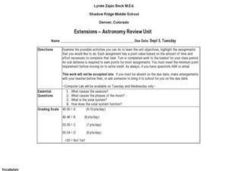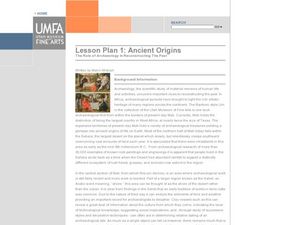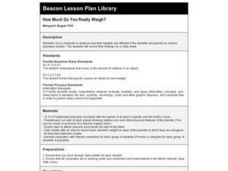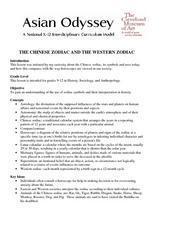Curated OER
United States Map
Students compare the United States on a globe and on a map. In this map lesson, students relate the sizes of the continents and locate the United States. Students identify the location of the continental US as well as Alaska and Hawaii.
Curated OER
Extensions - Astronomy Review Unit
Students participate in a review unit in Astronomy using the Layered Curriculum. This allows them to take charge of the type of assessment that is given. The method also allows better differentiation of instruction to occur.
Curated OER
Tall as a Mountain, Flat as a Plain
Students examine pictures of various landforms before placing them on a chart under the appropriate label.They sing songs about landforms to the tune of "She'll Be Comin' 'Round the Mountain." Next, they use non-edible baker's dough to...
Curated OER
The Day an Egg Solved the Mystery of the Cell
Students conduct an experiment comparing human cells to chicken cells. In this cells lesson plan, students conduct an experiment to see how nutrition moves through cells and how to better take care of their bodies.
Curated OER
Ancient Origins: The Role of Archaeology in Reconstructing the Past
Learners read information about the ancient origins of art and archaeology with a focus on the Malian culture. In this art origins lesson, students read background information for the topic and compare ancient and contemporary objects....
Curated OER
Rock Around the World
Learners take pictures and write a paragraph about a rock they have found. In this rock lesson plan, students also send their information to the Mars Space Flight Facility.
Curated OER
Mars
First graders listen as the teacher reads a copy of the WEEKLY READER that talks about Mars and ask questions accordingly. They again listen as a section about Earth is read from the magazine. Now, the class orally compare and contrast...
Curated OER
Taking Risks: Drug and Alcohol Abuse
Students discuss a video about drug and alcohol abuse and their connection to risk-taking. They answer questions on a risk factor sheet about the use of tobacco, drugs, and alcohol. They discuss long and short term goals and how not...
Curated OER
Moons
Students practice rote counting to 20. After a lecture about the planets and the moons that surround them, they identify the number of moons surrounding various planets. Students compare and contrast the quantity of moons surrounding...
Curated OER
How Much Do You Really Weigh?
Sixth graders check to see how their weights differ if they weighed themselves on different planets. They record their findings on a data sheet.
Curated OER
FILLING IN THE GAPS - Acquiring and Analyzing Satellite and Ground-Based Data
Learners monitor rainfall, compute daily averages, and compare their methods of computation to those used by actual researchers using satellite observations.
Curated OER
Astronomy Teamwork
Students work together in groups to complete an astronomy project. In the classroom, they find real objects to represent various objects in the solar system. After going outside, they practice using a distance scale and use their...
Curated OER
Where in the World is..?: An ecological study
Students analyze different ecosystems from the perspective of someone from another planet. They compare different ecosystems to determine which would be suitable to inhabit. This is an interdisciplinary activity.
Curated OER
Aerology- The Study of Mars
Learners investigate various aspects of the planet Mars. They examine a core sample that is simulated to make observations. Then compare the known sample with one that is unknown and differentiate between the two. Students hypothesize...
Curated OER
Gravity
Sixth graders explore the characteristics of gravity. They discuss gravity on Earth and then use cereal boxes to research and compare the weight of objects on Earth to the weight of those objects on other planets.
Curated OER
Temperature Variations and Habitability
Students, in groups, evaluate conditions outside the building and inside the classroom using thermometers, barometers, anemometers, etc. They compare interior and exterior conditions. They consider and discuss factors that contribute...
Curated OER
Observing Mars in the Night Sky
Students compare and contrast the orbits of Earth and Mars, locate the planet Mars, and diagram its retrograde motion.
Curated OER
Destination Mars!
Fifth graders view Mysteries of Earth & Mars Video on DVD and record thoughts in their online journal. They record data in a spreadsheet about each planet then form a theory of the best time to launch a space craft from Earth to land...
Curated OER
Today's Weather on Mars
Students investigate the temperature and wind data locally, nationally, and internationally and compare these conditions to those on Mars. Conclusions are drawn about the differences of these conditions and the causes for the variance...
Curated OER
Our Home in the Milky Way
Students gain appreciation of the vastness of our galaxy by viewing an applet about the Milky Way. Students hypothesize about how long it would take to get from Earth to Pluto.
Curated OER
As the World Turns
Third graders read books and participate in class discussions about the motion of the stars and planets and moons in relation to the Earth. In small groups, 3rd graders act out these movements to music.
Curated OER
The Chinese Zodiac And The Western Zodiac
High schoolers create individual horoscopes that contrast and compare Western and
Chinese views of their futures using poster boards and magic markers. In-class discussion is used to evaluate the use of the Zodiac in different cultures.
Curated OER
Scientific Theories
Ninth graders compare and contrast how different models can be used to represent scientific understandings. They evaluate the use of data when considering scientific claims. Students debate a variety of socio-scientific issues and the...
Curated OER
Wildlife Conservation (Senior, Science)
Twelfth graders explore wildlife and the diversity that makes up the living part of the planet Earth. The exploration part of the assignment is done on the Internet using selected web sites.

























